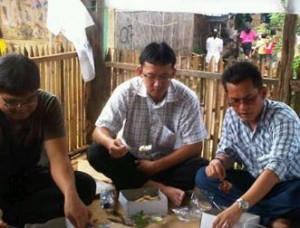2002 was a busy year for the Discovery Trip team in FICA. In that year, FICA conducted 2 Discovery Trips to comprehend the aspiration of Muslims and to understand civil society. These topics were chosen based on the context of the time.
The year 2001 will always be remembered as the year the radical Muslim declared Jihad to the West. This is not completely true; in reality they declared Jihad to the Infidels or non-Muslim. The Christians and other non-Muslim citizen in Indonesia have also suffered the radical Muslim wrath. In fact their wrath had been felt much earlier than 2001. As early as 1997, there was a lot of church destroyed and Christians killed mostly in the eastern part of Indonesia.
The ‘97 economic crisis was a blessing in disguise from God for Christians in Indonesia. The crisis diverted the attention of Soeharto’s regime, the primary backing of this militant Muslims, to economy rather than Islamization of Indonesia. Things were starting to turn around after the collapse of Soeharto’s regime due to its poor handling of the crisis.
The first DT conducted in 2002 was focused on understanding the aspiration of Muslims in Indonesia. FICA visited three strands of Muslim in Indonesia: radical, modernist (Muhamadiyah, Paramadina), and traditionalist (Nahdatul Ulama, Pesantren Al Munawaroh, Pusat Pengkajian Islam dan Masyarakat or PPIM). To understand their basic thinking, we asked generic questions such as their view of the west, Israel-Palestine conflict, and Shariah law in Indonesia. At that time, all the met parties have negative views on the West and toward Israel. Their view toward Israel was predictable; however their views on the West were rather surprising to us.
During our discussion on the implementation about Shariah law in Indonesia, it became clear that there were two competing visions on the role of Islam in Indonesia between the modernist and traditionalist factions. On one hand, the modernist envisioned Indonesia to become “Madani” society based on the Medina in the Prophet Mohammad days; on the other hand, the traditionalist wanted a Civil Society in which Islamic values are adopted into the nation’s social, political, economy fibers. The modernist wanted Indonesia not only be influenced by Islamic values, but also led by “Santri” or religious leaders. However, the traditionalist gave room for every capable leader to lead the country.
The radical view was extremely predictable. They described their calling to purify Islam in Indonesia through every mean necessary. Their goal was obviously clear which was and still is to build pan Islamic nation that extend across the whole continent.
During this DT, we were very impressed with the Muslim intellectuals. Their understanding on the issue of nation building, civil society, economic, culture was light years ahead of us. They could articulate their vision for Indonesia well. None of us could articulate the biblical vision for Indonesia to them. We should go back to the bible and really understand what Revelations 21 means in this generation and for Indonesia. What it takes for God to dwell in Indonesia so that the tear will be wiped and suffering should be no more.
We started the DT with fear and trembling. God guided us through the DT. It took a lot of preparation and sacrifices. Some of us could only visit Indonesia for a week, but had to spend 3 days for DT and missed several family functions. At the end of the DT, we were convinced that DT was worth the investment. The wall separating us and the Muslim started to crumble. We had bridged the wall mentally separating us with the Muslim in Indonesia. And, we stroke a good friendship with one of the young Muslim intellectual that we treasured even to this very day.

